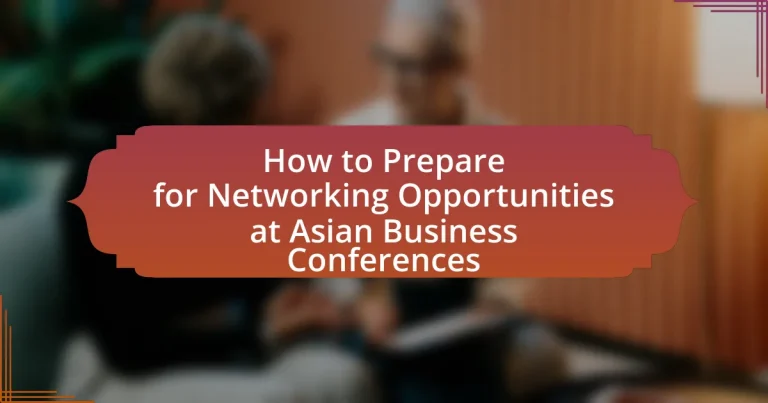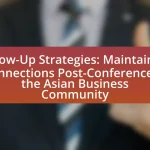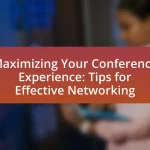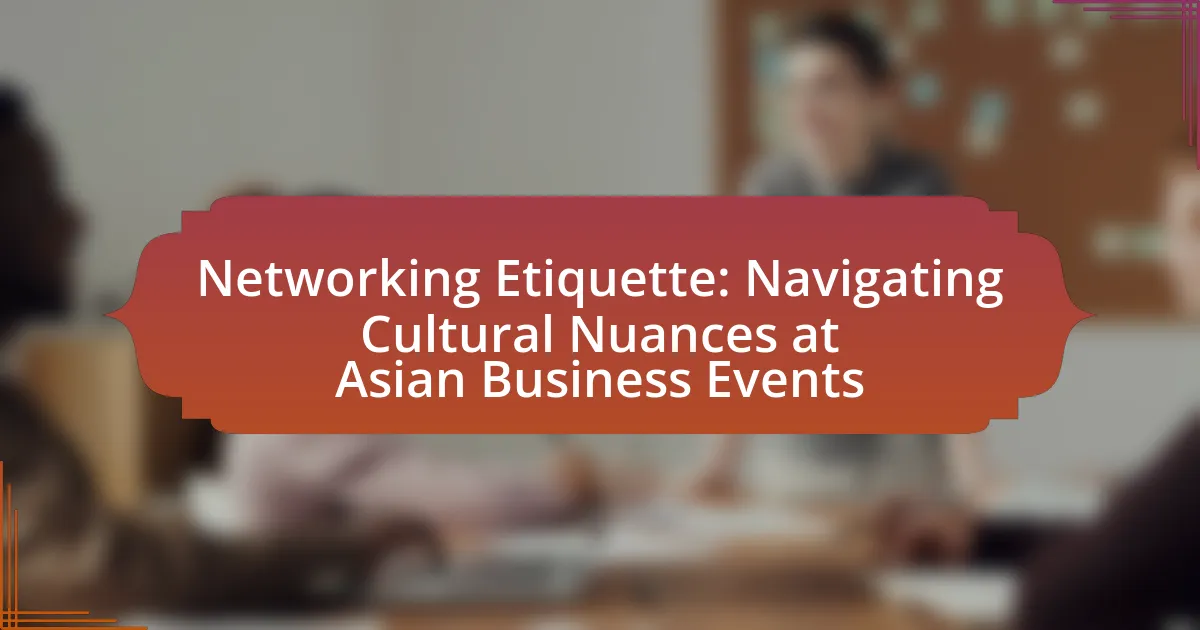The article focuses on preparing for networking opportunities at Asian business conferences, emphasizing the importance of relationship-building and cultural sensitivity in these settings. It outlines various networking formats, such as structured sessions and informal gatherings, and highlights the cultural factors that influence networking dynamics in Asia. Key strategies for effective networking, including research on attendees, practicing an elevator pitch, and utilizing social media, are discussed. Additionally, the article provides insights on maintaining connections post-conference and common mistakes to avoid, ensuring professionals can maximize their networking potential in the Asian business landscape.

What are Networking Opportunities at Asian Business Conferences?
Networking opportunities at Asian Business Conferences include structured networking sessions, panel discussions, and informal meet-and-greet events. These formats facilitate direct interactions among attendees, allowing for the exchange of ideas and business contacts. For instance, structured networking sessions often involve speed networking, where participants engage in brief conversations to maximize connections. Additionally, panel discussions provide a platform for attendees to ask questions and engage with industry leaders, further enhancing networking potential. Informal meet-and-greet events create a relaxed atmosphere for attendees to build relationships organically. Such opportunities are crucial for fostering collaborations and expanding professional networks in the Asian business landscape.
How do networking opportunities differ at Asian business conferences compared to other regions?
Networking opportunities at Asian business conferences often emphasize relationship-building and hierarchical respect more than in other regions. In Asia, networking is frequently approached as a long-term investment, where personal connections and trust are prioritized, reflecting cultural values such as collectivism and respect for authority. For instance, in countries like Japan and China, business relationships often begin with informal meetings or social gatherings, which serve to establish rapport before any formal business discussions occur. This contrasts with Western regions, where networking may focus more on immediate transactional benefits and direct business discussions. Additionally, Asian conferences may include structured networking sessions that are culturally tailored, such as tea ceremonies or formal dinners, which facilitate deeper connections.
What cultural factors influence networking at Asian business conferences?
Cultural factors that influence networking at Asian business conferences include collectivism, hierarchy, and relationship-building. Collectivism emphasizes group harmony and collaboration, leading participants to prioritize group interests over individual ambitions, which shapes networking dynamics. Hierarchical structures in many Asian cultures dictate formal interactions, where respect for seniority influences how individuals approach networking opportunities. Additionally, relationship-building is crucial; establishing trust and rapport often precedes business discussions, making personal connections a key aspect of networking in these settings. These cultural elements are supported by research indicating that interpersonal relationships significantly impact business success in Asian markets.
How do business practices in Asia shape networking opportunities?
Business practices in Asia significantly shape networking opportunities by emphasizing relationship-building and trust. In many Asian cultures, business is often conducted through personal connections, where establishing rapport is crucial before any formal agreements are made. For instance, in countries like Japan and China, networking often involves social gatherings, such as dinners or tea ceremonies, which serve as platforms for building long-term relationships rather than immediate transactions. This approach is supported by the concept of “guanxi” in China, which refers to the networks of influence and relationships that facilitate business dealings. Research indicates that 70% of business deals in Asia are influenced by personal relationships, highlighting the importance of networking in these contexts.
Why are networking opportunities important for professionals attending Asian business conferences?
Networking opportunities are crucial for professionals attending Asian business conferences because they facilitate the establishment of valuable connections that can lead to business collaborations and partnerships. These conferences often attract industry leaders, potential clients, and key decision-makers, providing attendees with access to a diverse network that can enhance their professional growth. According to a study by the Harvard Business Review, 70% of jobs are found through networking, highlighting the importance of building relationships in a business context. Additionally, networking at these events allows professionals to exchange ideas, gain insights into market trends, and share best practices, which can be instrumental in driving innovation and competitiveness in their respective fields.
What benefits can attendees gain from effective networking?
Attendees can gain numerous benefits from effective networking, including access to new business opportunities, valuable industry insights, and the establishment of meaningful professional relationships. Networking allows individuals to connect with potential clients, partners, and mentors, which can lead to collaborations and increased visibility in their respective fields. Research indicates that 85% of jobs are filled through networking, highlighting its importance in career advancement. Additionally, networking provides a platform for sharing knowledge and best practices, fostering innovation and growth within industries.
How can networking lead to business collaborations and partnerships?
Networking can lead to business collaborations and partnerships by facilitating connections between individuals and organizations that share mutual interests and goals. Through networking events, professionals can exchange ideas, resources, and opportunities, which can result in joint ventures or strategic alliances. For instance, a study by the Harvard Business Review found that 70% of jobs are found through networking, highlighting its effectiveness in creating professional relationships that can evolve into business partnerships.
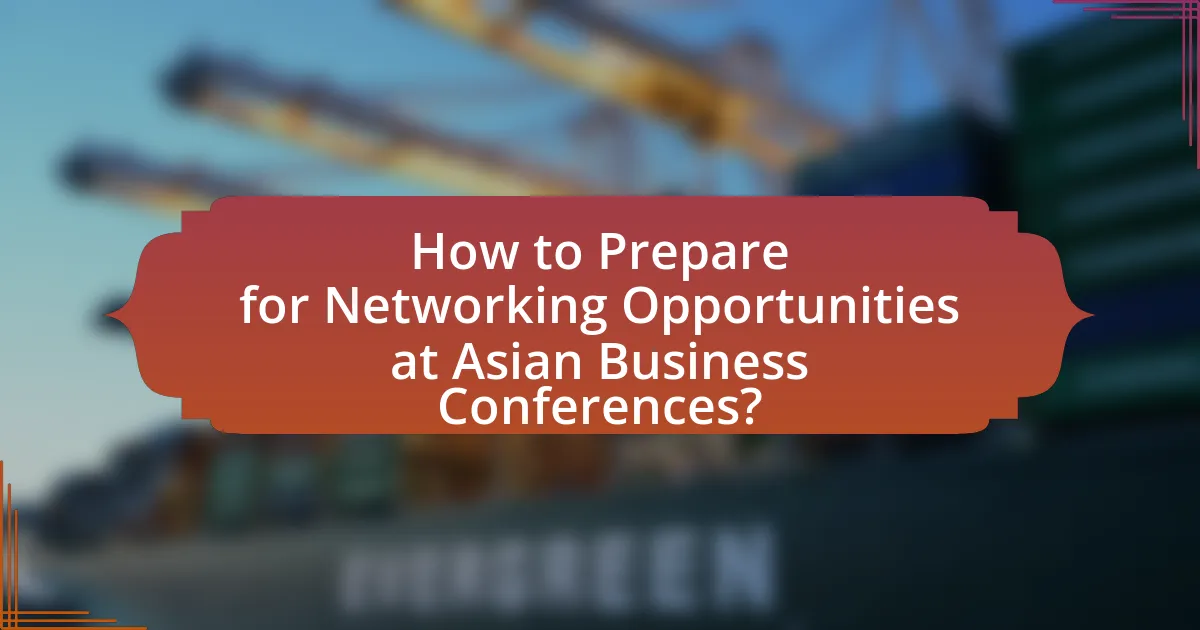
How to Prepare for Networking Opportunities at Asian Business Conferences?
To prepare for networking opportunities at Asian business conferences, individuals should research the attendees and speakers in advance. This preparation allows for targeted conversations and the establishment of relevant connections. According to a study by the Harvard Business Review, effective networking can lead to significant career advancements, emphasizing the importance of knowing whom to approach. Additionally, practicing an elevator pitch tailored to the specific industry or conference theme can enhance engagement. Preparing business cards with clear contact information is also crucial, as studies show that exchanging cards increases the likelihood of follow-up interactions.
What steps should you take before attending an Asian business conference?
Before attending an Asian business conference, you should conduct thorough research on the event, including its agenda, speakers, and attendees. This preparation allows you to identify key networking opportunities and tailor your approach to engage effectively with relevant participants. Additionally, reviewing cultural norms and business etiquette specific to the region can enhance your interactions and demonstrate respect for local customs. For instance, understanding the importance of hierarchy in Asian business culture can inform how you address and interact with senior executives.
How can you research attendees and speakers in advance?
To research attendees and speakers in advance, utilize professional networking platforms like LinkedIn to gather information about their backgrounds, interests, and professional achievements. This approach allows you to identify common connections and topics of discussion, enhancing your networking strategy. Additionally, review the event’s official website or agenda, which often lists speakers along with their bios and session topics, providing insights into their expertise and potential discussion points. According to a study by the Event Marketing Institute, 84% of event attendees find networking opportunities valuable, underscoring the importance of thorough preparation.
What materials should you prepare for effective networking?
To prepare for effective networking, you should have business cards, a polished elevator pitch, and a digital portfolio or resume. Business cards facilitate easy exchange of contact information, ensuring that connections can be made quickly and efficiently. A well-crafted elevator pitch allows you to succinctly communicate your professional background and objectives, making a memorable impression on potential contacts. Additionally, a digital portfolio or resume showcases your skills and accomplishments, providing tangible proof of your expertise and enhancing your credibility during conversations. These materials collectively enhance your networking effectiveness by making interactions more professional and memorable.
How can you enhance your networking skills prior to the conference?
To enhance your networking skills prior to the conference, actively engage in online platforms relevant to the conference theme, such as LinkedIn or industry-specific forums. By participating in discussions, sharing insights, and connecting with attendees beforehand, you establish a presence and build rapport. Research indicates that pre-conference engagement can increase the likelihood of meaningful connections, as 70% of professionals find that prior interactions lead to more productive networking experiences.
What role does practicing your elevator pitch play in networking?
Practicing your elevator pitch is crucial in networking as it enhances clarity and confidence when communicating your value proposition. A well-rehearsed elevator pitch allows individuals to succinctly convey their professional identity and objectives, making a memorable impression on potential contacts. Research indicates that effective communication skills, including the ability to deliver a concise pitch, significantly increase networking success rates, as individuals are more likely to engage with someone who presents themselves clearly and confidently.
How can you develop active listening skills for better engagement?
To develop active listening skills for better engagement, practice focusing entirely on the speaker without distractions. This involves maintaining eye contact, nodding to show understanding, and summarizing what the speaker has said to confirm comprehension. Research indicates that active listening can enhance interpersonal relationships and improve communication effectiveness, as demonstrated in a study published in the Journal of Business Communication, which found that effective listeners are perceived as more trustworthy and competent. Engaging in these practices not only fosters better connections but also encourages more meaningful conversations, particularly in networking settings like Asian business conferences.
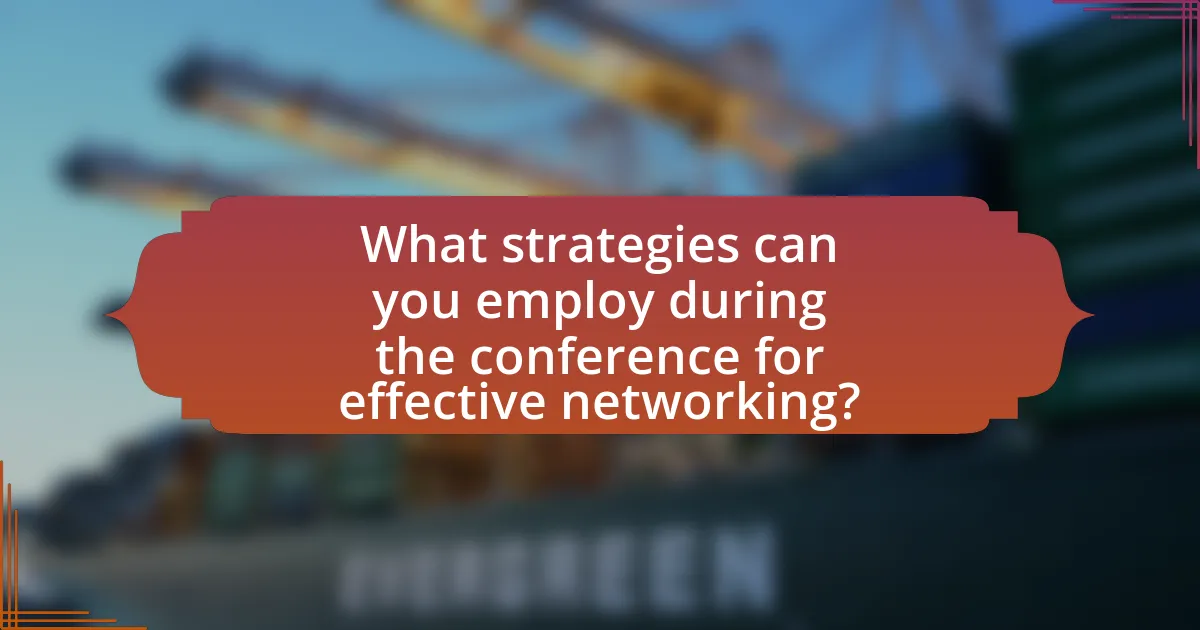
What strategies can you employ during the conference for effective networking?
To network effectively during a conference, engage in active listening and initiate conversations with attendees. Active listening fosters genuine connections, allowing you to understand others’ needs and interests, which can lead to meaningful discussions. Initiating conversations can be achieved by asking open-ended questions about their experiences or insights related to the conference topics. Research indicates that networking is most effective when individuals focus on building relationships rather than merely exchanging business cards; a study by the Harvard Business Review highlights that 70% of professionals value quality interactions over quantity. Additionally, utilizing social media platforms like LinkedIn to connect with attendees before and after the event can enhance your networking efforts, as it provides a platform for ongoing communication and relationship building.
How can you initiate conversations with other attendees?
To initiate conversations with other attendees, approach individuals or groups with a friendly demeanor and introduce yourself clearly. Engaging in small talk about the event, such as discussing a keynote speaker or a session topic, can serve as an effective icebreaker. Research indicates that shared experiences, like attending the same conference, create a natural context for conversation, making it easier to connect. Additionally, asking open-ended questions about their interests or experiences can encourage dialogue and foster networking opportunities.
What are some effective icebreakers to use in networking situations?
Effective icebreakers to use in networking situations include asking open-ended questions, sharing a personal anecdote, or commenting on the event itself. Open-ended questions, such as “What inspired you to attend this conference?” encourage dialogue and allow for deeper connections. Sharing a personal anecdote related to the industry can create relatability and foster a more engaging conversation. Additionally, commenting on the event, like “What do you think of the keynote speaker?” can serve as a natural segue into further discussion. These strategies are supported by research indicating that initiating conversations with engaging questions or relatable stories enhances networking effectiveness and builds rapport.
How can you leverage social media for real-time networking during the event?
You can leverage social media for real-time networking during the event by actively engaging with event-specific hashtags and platforms. By using designated hashtags, attendees can easily find and connect with others participating in the same event, facilitating immediate interactions. For instance, a study by the Pew Research Center indicates that 69% of adults in the U.S. use social media, making it a powerful tool for reaching a wide audience quickly. Additionally, platforms like Twitter and LinkedIn allow users to share insights, ask questions, and arrange meet-ups in real-time, enhancing networking opportunities.
What follow-up actions should you take after the conference?
After the conference, you should send personalized follow-up emails to the contacts you made. This action reinforces connections and expresses appreciation for their time and insights. Research indicates that timely follow-ups, ideally within 24 to 48 hours post-event, significantly increase the likelihood of establishing lasting professional relationships. Additionally, you should connect with these individuals on professional networking platforms, such as LinkedIn, to maintain ongoing communication and visibility. Engaging with their content and sharing relevant articles can further solidify these connections.
How can you maintain connections made during the conference?
To maintain connections made during the conference, follow up with attendees through personalized emails or messages within a week of the event. This prompt communication reinforces the relationship and shows genuine interest. Additionally, connect on professional networking platforms like LinkedIn, where you can share relevant content and updates, further nurturing the relationship. Research indicates that timely follow-ups can increase the likelihood of lasting professional connections, as noted in studies on networking effectiveness.
What tools can assist in organizing and managing your new contacts?
Contact management software such as HubSpot, Salesforce, and Zoho CRM can assist in organizing and managing your new contacts. These tools provide features like contact categorization, tagging, and integration with email and calendar applications, which streamline the process of maintaining relationships. For instance, HubSpot offers a free CRM that allows users to track interactions and manage contact information efficiently, while Salesforce is known for its robust analytics and reporting capabilities, enabling users to assess engagement levels. Zoho CRM also provides automation features that help in nurturing leads and maintaining follow-ups, making it easier to manage a growing network effectively.
What are some best practices for successful networking at Asian business conferences?
Successful networking at Asian business conferences involves building genuine relationships, understanding cultural nuances, and being prepared. Attendees should research participants and speakers beforehand to identify key individuals to connect with, which enhances the likelihood of meaningful interactions. Additionally, practicing cultural etiquette, such as greeting with respect and exchanging business cards properly, fosters goodwill and opens doors for future collaboration. Engaging in active listening and asking insightful questions demonstrates interest and respect, which are highly valued in many Asian cultures. Following up with personalized messages after the conference solidifies connections and shows commitment to maintaining the relationship. These practices are supported by studies indicating that effective networking relies on relationship-building and cultural awareness, which are crucial in diverse business environments.
How can cultural sensitivity enhance your networking experience?
Cultural sensitivity enhances networking experiences by fostering trust and rapport among diverse individuals. When participants demonstrate an understanding of cultural norms and values, they create an inclusive environment that encourages open communication. Research indicates that culturally sensitive interactions can lead to stronger professional relationships, as individuals feel respected and valued. For instance, a study published in the Journal of International Business Studies found that culturally aware networking significantly improves collaboration and partnership opportunities in multicultural settings. This evidence underscores the importance of cultural sensitivity in maximizing the effectiveness of networking at Asian business conferences.
What common mistakes should you avoid while networking?
Common mistakes to avoid while networking include failing to research attendees, neglecting to follow up, and focusing solely on personal gain. Researching attendees helps identify potential connections and relevant topics for discussion, enhancing engagement. Neglecting follow-up can lead to missed opportunities; studies show that 80% of networking success comes from post-event communication. Focusing solely on personal gain can alienate potential contacts; effective networking is about building mutually beneficial relationships.
